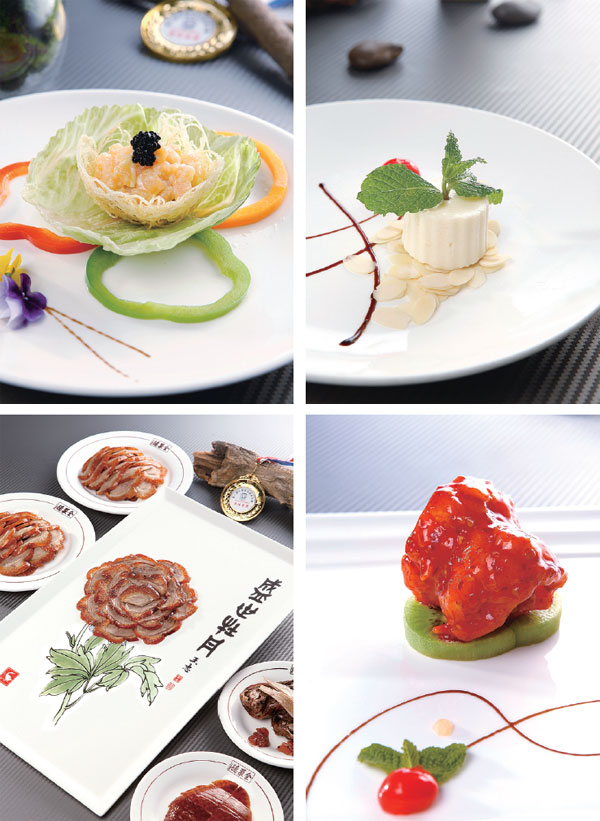Up ahead: food feasts
Restaurants in China, including the Quanjude Group, have already begun preparing for the celebration to ring in the upcoming Lunar New Year
The upcoming Spring Festival falls in January 2017. And as more Chinese nowadays prefer to dine out to celebrate the festival, restaurants in China have already begun preparing for the celebration.
The Quanjude Group, which owns the popular brands Quanjude, Fengzeyuan, Sichuan Restaurant, and Fangshan Restaurant, has just released its 2017 Spring Festival dinner menus, featuring its signature and award-winning delicacies.
Its renowned Peking roast duck franchise Quanjude was established more than 150 years ago, and the group now operates restaurants both at home and abroad.
|
Quanjude Group has launched set menus for Spring Festival celebration, featuring its time-honored and award-winning delicacies. Photos by Jiang Dong / China Daily |
The highlights of its menus are dishes that have won at the World Championship of Chinese Cuisine, which is held once every four years. It is one of the most celebrated Chinese cuisine competitions in the world.
The event this year was held from Sep 19 to 21 in Rotterdam, in the Netherlands, and attracted more than 200 chefs from around 20 countries and regions.
The competition was fierce. Quanjude's contestants were chefs from the Wangfujing branch of the Quanjude Peking roast duck franchise, and they carried some of their ingredients, seasonings, and tableware, from Beijing.
Yet, they still had to overcome obstacles such as lack of proper cooking devices and ingredients to present the Group's culinary traditions and innovation through eight dishes.
For instance, they could not get conches big enough to cook a cold dish, but managed to create alluring taste and texture with the local produce thanks to their skill, Zhu Ruibo, the general manager of the Quanjude Wangfujing branch says.
The eight dishes that the Quanjude chefs cooked were the company's time-honored dishes with a bit of innovation in presentation and taste to appeal to modern palates.
The "peony duck", or Peking roast duck that resembles a fully opened peony blossom, was the star of the competition.
It debuted as the main course at a state banquet at the Asia-Pacific Economic Cooperation summit in Beijing in 2014, and since then has become the company's most renowned creation.
The "petals" of the peony duck are made up with tender, savory duck meat delicately sliced and arranged, each with a sliver of roast duck skin that is very crispy and delicious.
Popular as the peony duck is, the chefs gave it a twist - for the Spring Festival dinner, the duck is to be served with handmade pancakes.
The diced scallop salad served with dried potato is an innovation based on the company's traditional signature dish - sauteed duck with shredded fried potato.
Here, the potatoes are shredded and deep-fried, to resemble a bird's nest. The nest sits on a piece of cabbage, and inside it is the salad made of scallop.
The dish is bite-sized, and the combination of the potatoes, crunchy vegetable and the scallop salad create a flavorful delicacy.
The pine mushroom and chicken broth is a new dish based on a signature Sichuan dish, ji dou hua, or chicken tofu soup.
For more than 100 years, Sichuan's chefs have mixed minced chicken, egg whites and other ingredients in precise proportions and boiled the mixture in chicken soup so that the final result resembles tofu but tastes like chicken.
The Quanjude version does not use only chicken but also the flesh of the sole to make the "tofu", so that it looks whiter and had a tender texture.
The pine mushroom also improves the chicken soup, both in terms of taste and nutrition.
Another must-have is the dragon-beard cake, which gets its name because it looks like a dragon's beard.
One of the Quanjude Group's signature dishes, the dragon-beard cake has won numerous awards, both at home and abroad.
To make it, the chefs use a traditional technique to pull wheat dough into thin threads that can penetrate the eye of a needle. One kilogram of wheat flour can be made into more than 30,000 dough threads that have a length of more than 50,000 meters in total.
The beard-like threads are then deep-fried and topped with milk cream and chocolate.
The set menus will be available throughout the festival at the company's restaurants all over the country. Diners can make reservations for the set menus through hotlines and the Internet, using the QR code or visiting Dianping.com.
The company will offer special gifts to those making dinner bookings before Jan 26, 2017.
liuzhihua@chinadaily.com.cn
(China Daily 12/03/2016 page18)























